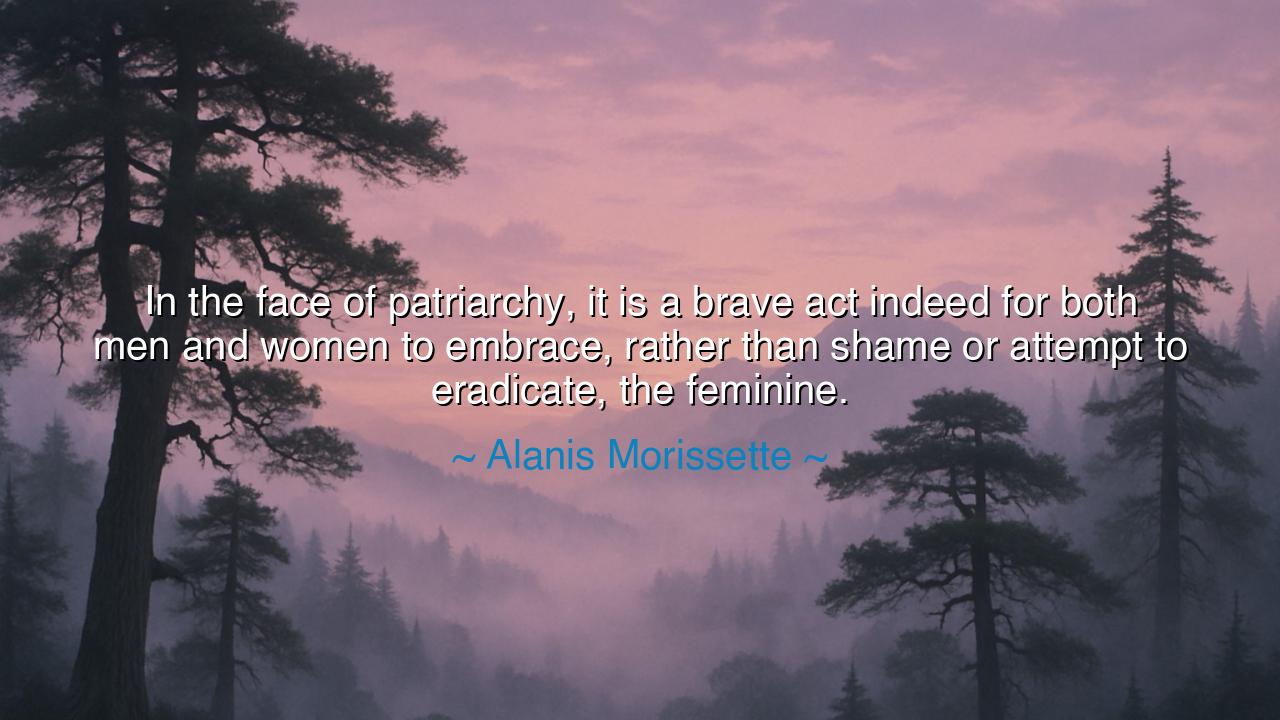
In the face of patriarchy, it is a brave act indeed for both men
In the face of patriarchy, it is a brave act indeed for both men and women to embrace, rather than shame or attempt to eradicate, the feminine.






Alanis Morissette, singer of spirit and poet of the soul, once proclaimed: “In the face of patriarchy, it is a brave act indeed for both men and women to embrace, rather than shame or attempt to eradicate, the feminine.” These words are not merely a defense of women, but a hymn to the power of the feminine itself—intuition, compassion, creativity, and tenderness—that has long been suppressed under the weight of systems that exalt dominance, conquest, and hardness as the only virtues. To embrace the feminine in such a world is not weakness, but rebellion; not surrender, but courage.
The origin of her words lies in the struggle against patriarchy, that ancient structure which taught men to scorn softness and women to distrust their own strength unless clothed in masculine guise. Morissette reminds us that the true act of healing is not to imitate patriarchy, but to reclaim what it denied. The feminine, far from being an enemy to progress, is its salvation, for it tempers cruelty with empathy, ambition with wisdom, and power with care.
History bears witness in the tale of Mahatma Gandhi, who, though a man, embodied the feminine virtues of patience, nonviolence, and humility. In the face of empire, he chose not the sword but the strength of compassion, and with it, he moved a nation toward freedom. His life stands as proof that to embrace the feminine is not to diminish one’s power, but to magnify it in a higher form. Here, Morissette’s words find flesh: courage is not only in the fist, but also in the open hand.
So too in the story of Eleanor Roosevelt, who transformed the role of First Lady from silent ornament to global advocate. She did not abandon her feminine qualities but wielded them—empathy, persistence, and vision—as tools to forge the Universal Declaration of Human Rights. In a world dominated by statesmen, she showed that the feminine voice could echo louder than cannons, shaping the destiny of nations.
Therefore, O children of the future, hear this wisdom: do not despise the feminine, nor seek to bury it beneath masks of hardness. In both men and women it dwells, waiting to be honored. To embrace it is to challenge the cold order of patriarchy, and to restore balance to the world. For only when the masculine and the feminine walk together, unashamed, can humanity rise whole into its destiny.






7CPham 7A Chi
Morissette’s perspective is a powerful reminder that breaking free from patriarchal norms requires courage on both sides of the gender spectrum. How can we encourage both men and women to value the feminine without fear of being labeled weak? I think this quote pushes us to challenge the binary ideas of masculinity and femininity and recognize that we all embody a spectrum of traits that should be celebrated, not shamed.
DNDam Nhu
This quote made me reflect on how patriarchy has ingrained certain ideas in our minds, such as the idea that the feminine is less valuable. If we allowed ourselves to embrace these qualities—whether we are men or women—what would the world look like? Is the suppression of the feminine causing harm to our emotional well-being? Could this embrace actually be the key to breaking free from limiting gender roles?
PTPhuong TG
Alanis Morissette’s quote strikes me as a call for healing, for men and women alike, in how we approach gender. Why do we still struggle with accepting the feminine as a valid and powerful part of who we are? Could embracing it lead to a better understanding of ourselves and others? I believe this shift would allow for more equality and emotional depth in relationships and society at large.
HTHien Tran
This quote challenges us to rethink how we perceive gender traits. Is the fear or rejection of the feminine rooted in insecurity or fear of weakness? How would embracing both the masculine and feminine in all people change the way we relate to one another? Perhaps this is an invitation for us all—men and women—to break free from the constraints of a patriarchal mindset and accept qualities that make us whole.
BPDo Ba Bao Phuc
I find this quote deeply meaningful. It suggests that challenging patriarchy isn’t just about empowering women but also about freeing men from rigid expectations. Could embracing the feminine actually make men more authentic and human? How does patriarchy trap men in roles that limit their emotional range? If we allowed men to embrace qualities traditionally labeled as 'feminine,' would it lead to a healthier, more balanced society?